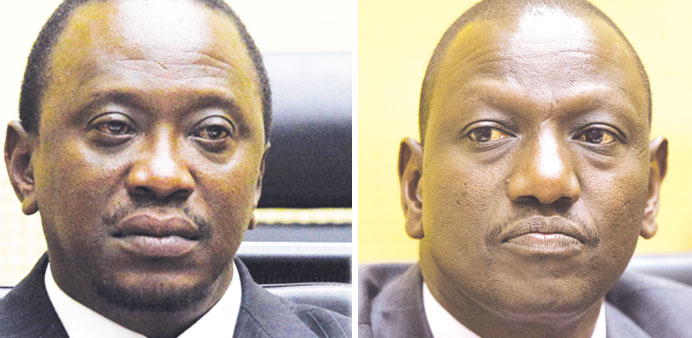The UN Security Council has rejected an African demand to suspend the International Criminal Court trial of Kenya’s president and vice-president for one year.
The African states’ call for the deferral was the biggest challenge yet to the trials of President Uhuru Kenyatta and Vice-President William Ruto who are accused of fomenting deadly political unrest.
But the resolution got only seven votes, two below the number needed to pass in the 15-member body.
Eight council nations, all ICC members or supporters including Britain, France and the United States, abstained to ensure the failure of the bid.
It was the first time in decades that a Security Council resolution has failed in such a way without a veto by one of the permanent members.
The African nations had wanted the Council to use its power under the ICC’s founding statute to suspend a case for one year when it could be a threat to peace.
The draft resolution said the court case is “distracting and preventing” Kenyatta and Ruto from carrying out their duties.
It took up African Union complaints that the two should be left to handle Kenya’s role in battling Islamist militants in Somalia and the aftermath of September’s mall attack in Nairobi, which left 67 dead.
Russia’s UN ambassador Vitaly Churkin, who backed the resolution, said that African countries had presented “most compelling arguments” for a suspension.
ICC member states acknowledge that Kenya is a special case. But Western diplomats and activists see the campaign to halt the proceedings as largely political and, more generally by countries opposed to the ICC, to discredit the court.
The African nations, led by Rwanda, who proposed the resolution faced strong criticism for the challenge and the way it was forced upon the council.
Guatemala’s UN ambassador Gert Rosenthal called the vote an act of “contempt” against UN Security Council countries that had sought to help Africa with peacekeeping troops and efforts to boost justice in the continent.
“We are disappointed that this draft resolution was unnecessarily put to a vote,” commented Britain’s UN envoy Mark Lyall Grant.
France’s UN ambassador Gerard Araud said the draft resolution had created an “artificial confrontation” between the African Union and the Security Council.
Australia’s ambassador Gary Quinlan called the vote “unnecessary”.
US ambassador Samantha Power joined Britain and France in saying that Africa’s complaints should be put to a meeting of the ICC member countries due to start in The Hague next Wednesday.
The meeting is to consider changes in procedure which could ease the conditions for the trials of the Kenyan leaders.
The United States is not an ICC member but strongly supports its work.
Kenyatta and Ruto are accused of masterminding unrest after a presidential election in December 2007 in which at least 1,100 people died. Kenyatta and Ruto took office after an election this year.
“We believe that justice for the victims of that violence is critical to the country’s long term peace and security,” Power said.
Ruto’s trial has started, while that of Kenyatta is scheduled to get underway February 5 after being delayed three times.
African leaders frequently complain that the ICC discriminates against their continent.
All eight cases being investigated by the ICC concern Africa. But nearly all were called for by the countries involved and Africa’s 34 members make up a key chunk of the court’s 122 signatories.
Rwanda’s UN ambassador Eugene Richard Gasana said that the Security Council had “failed” Kenya by rejecting the vote and it was a “shame” for the body.
He said that African countries behind the move had not sought “confrontation” and that the Kenyan leaders had to be backed in their “fight against terrorism.”
“Kenya’s leadership wants these cases squashed, but that would rob the victims of horrific crimes of any hope of redress,” said Richard Dicker, international justice specialist for Human Rights Watch. “One wonders whether the governments which pushed the resolution did so in a bid to ward off the possibility of their own officials being prosecuted for crimes in the future.”

